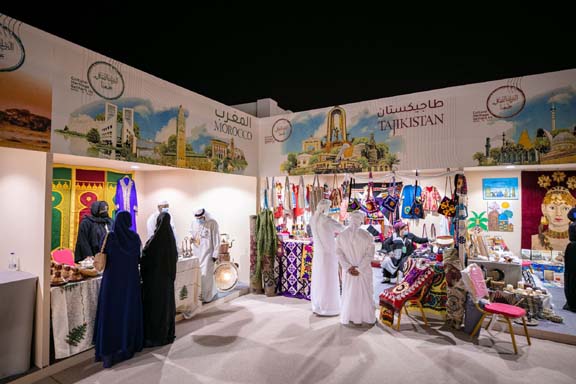18th edition of Sharjah Heritage Days highlights the incredible value of cultural diversity to more than 127,000 visitors

As the curtains came down on the 18thedition of Sharjah Heritage Days (SHD) yesterday (Saturday, April 10), the three-week celebration of an eclectic mix of local and global cultures and traditions left a deep impact on more than 127,000 people from the UAE and beyond who immersed themselves in the festival’s 500+ carefully curated activities and events.
Over a 22-day period, the emirate was transformed into a microcosm of global cultures as 29 nations descended on the historic heritage areaat the Heart of Sharjah, exchanging their unique artistic and cultural expressions to the multinational residents of Sharjah and the UAE.
Organised by Sharjah Institute for Heritage (SIH),SHD carried the theme, ‘Culturalheritage gathers us’, andreflected the vision and directives of His Highness Sheikh Dr. Sultan bin Muhammad Al Qasimi, Supreme Council Member and Ruler of Sharjah.
For history buffs, curious explorers, and global citizens who seek a more nuanced understanding of the world’s diversity, the festival grounds served as a vibrant platform to learn about cultural commonalities, celebrate the unique differences, and acknowledge the continued relevance of shared heritage even in today’s modern times.
SHD played an especially important role in gathering younger generations around the subject of local and global cultural heritage and actively engaged them through a special programme of events, activities and workshops designed for them.
His Excellency Dr. Abdulaziz Al Musallam, Chairman of the Sharjah Institute for Heritage, Chairman of the Higher Committee of Sharjah Heritage Days,said:"This edition was a continuation of Sharjah’s cultural journey led by His Highness the Ruler of Sharjah. The festivalwas successful in highlighting and celebratinglocal and global heritage, and enabled us to reinforce Sharjah's message that culture and heritage unify us especially during challenging times like what we are witnessing now due to the COVID-19 pandemic.”
He added: "The success of the 18thedition of SHD was not only a result of the dedicated efforts of the Sharjah Heritage Institute OrganisingCommittees but was also ensured by the unique and extraordinary participation of 29 nations. The enthusiasm we received from the festival’s visitors while adhering to all safety and preventative measures was also a key enabler of SHD’s success. Finally, we would like to thank our partnering entities, societies and volunteers who came together to support, promote and enhance the overall quality of the festival this year.”
Spectacular cultural pageantry
The Republic of Montenegro – theGuest of Honour country, wooed crowds with the majestic moves and eye-catching traditional Balkan costumes of its spectacular folk dances; Kazakhstan - the festival’s Special Guest shared its unique crafts, foods, colorful garments, and folkloric performances with visitors; Tajikistan regaled audiences with beautifully choreographed ceremonial dances accompanied by a five-piece orchestra; while with their spirited dancing movements and soaring music,the folklores of Bashkortostan, Macedonia, Spain, India, Russia, and Bulgaria found their way into the hearts and minds of visitors.
The ethos and gallantry of Emirati culture was brought to life with traditional arts and dances – Ayyala, Nuban, Andima, Razif and Rawahh, Harbiya, Liwa, Habban, and Daan – which embody Emirati values and heritage.
For 22 days, visitors traipsed through the World Heritage Pavilion where the ethnic influences of Kenya and Sudan, artistic and graphic Kazakh felt carpeting traditions, wooden lacquerware art from the island nation of Maldives, and the rich, aesthetic handcrafted traditions of Tajikistan, amongst others, stirred our collective cultural consciousness.
Across the Heart of Sharjah, other live demonstrations of traditional heritage crafts from around the world piqued the curiosity of visitors as Tunisia showcased the art of drum-making, Egypt turned the spotlight on the art of bookbinding, Jordan impressed with its handwoven artistry, and Palestine drew attention to its exquisite embroidery traditions.
Visitors savoured a slice of Omani history with its indulgent halwa-making tradition while the marbled aesthetic of Ebru, an Islamic decorative art form dating to the Ottoman period, inspired onlookers.
Unique facets of Emirati heritage
The pride of identity and distinctive sense of community of the Emirati people resonated through at the Heritage Crafts Village where indigenous craft forms rooted in the UAE culture, and transmitted from generation to generation, were under the spotlight, where women artisans demonstrated the creativity and resilience of traditional crafts that have stood the test of time – Al Sadu wool weaving, Talli embroidery, Safeefah palm weaving, Burqa’a, and kohl and incense-making, amongst others.
The shared memories of communal heritage also reverberated across the recreated scenarios of UAE's four diverse natural environments: the mountains, desert, coastal and agriculture – where the emotional attachment to the olden ways of life and its diverse craftsmanship struck a chord with men, womenand children of all nationalities.
From theatrical performances, songs and poetry to storytelling sessions, photography exhibitions, reading corners, academic discussions, family programmes, global culinary delights, and an array of workshops at the dedicated Children’s Village and throughout the venue, the Sharjah Heritage Days truly underscored the incredible value of cultural diversity.
Another spectacular achievement during SHD saw the Sharjah Institute for Heritage celebrate the launch of more than 24 books, memoirs, glossaries and academic studies on various elements of local and global cultural heritage and history.
Perhaps the largest and longest celebration of local and global cultures in the UAE and the region, SHD achieved its objectives of being accessible to and safe for the residents and visitors of the UAE by showcasing its offerings across three venues in Sharjah – Heart of Sharjah district, Khorfakkan heritage area and in Kalba.